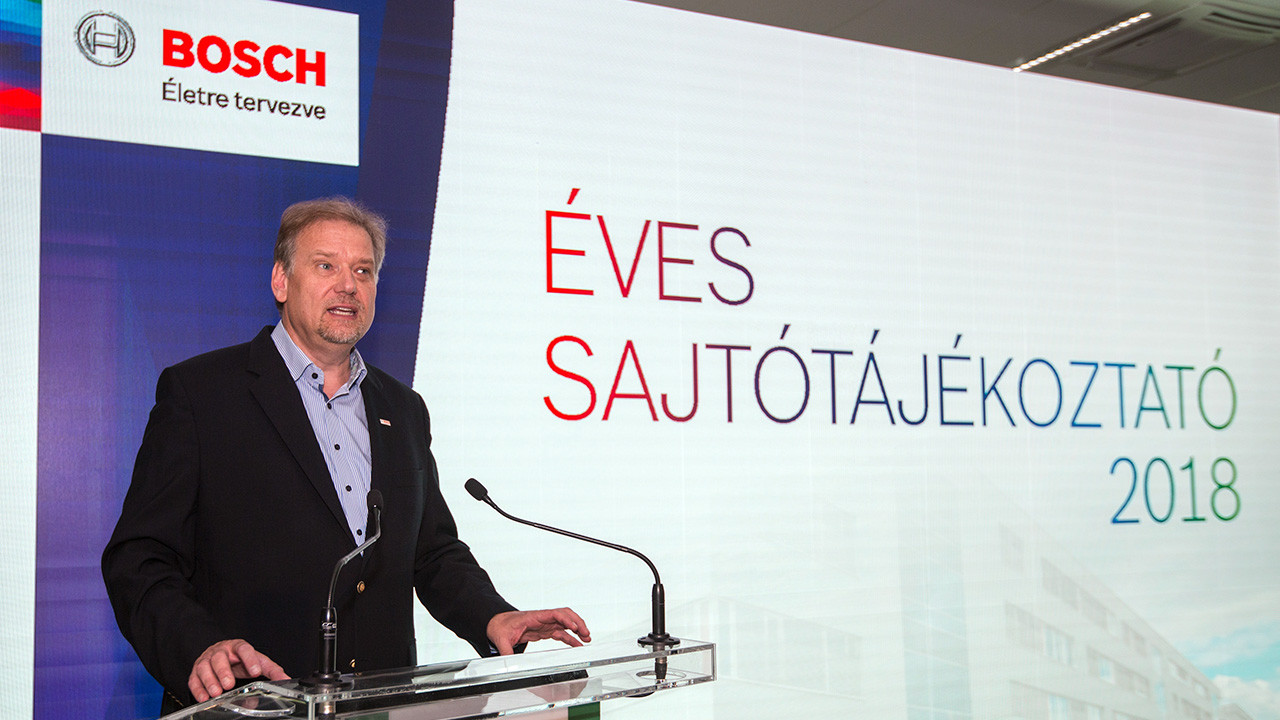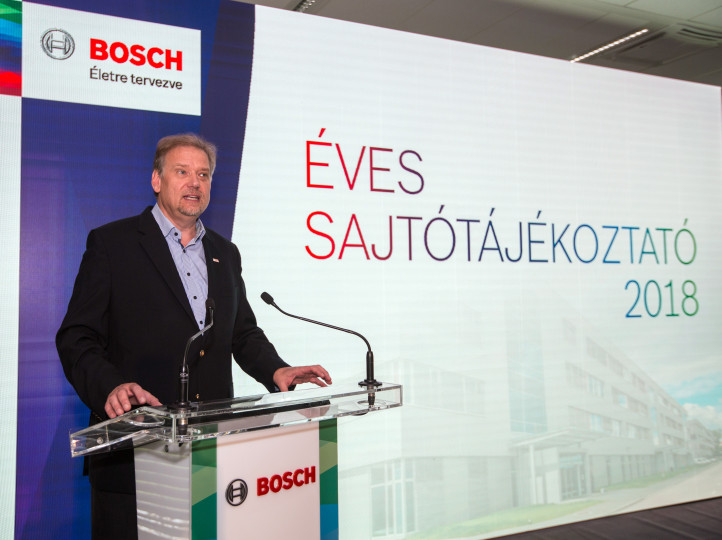Budapest – Bosch, a leading global supplier of technologies and services, achieved growth in every area of its Hungarian operations in 2017. Its total net sales in Hungary, including sales of non-consolidated companies and internal deliveries to affiliated companies, increased by 13 percent to 1,304 billion forints in 2017. In the same period, its sales on the Hungarian market increased by 2 percent to 244 billion forints. Speaking at the company’s annual press conference in Budapest, Daniel Korioth, the Representative of the Bosch Group in Hungary, said, “Bosch operates a successful business in Hungary, and this success enables, authorises and obliges us to shape the future with all of our strength and expertise. This year is again very promising for us, with many ongoing projects and developments coming to completion.” Reflecting this year start he added, “On the basis of these positive developments and a good sales performance in the first quarter, we expect sales to grow further this year. We are confident that our business activities will continue to contribute to Hungary’s development.”
“Bosch operates a successful business in Hungary, and this success enables, authorises and obliges us to shape the future with all of our strength and expertise. This year is again very promising for us, with many ongoing projects and developments coming to completion.”
– said Daniel Korioth, the Representative of the Bosch Group in Hungary at the company’s annual press conference in Budapest.
Key role of R&D
The Bosch Group pursued research and development (R&D) at four sites in Hungary in 2017, with a budget of 55 billion forints, more than ever before. In the power tools plant in Miskolc, innovation activity ranges from the product idea through the conceptual phase and manufacturing development right up to market launch. Bosch’s automotive engineers in Hungary are working on future mobility, concentrating on automated driving and electric mobility. In Eger, they are developing electric steering systems, one of the basic building blocks of automated driving. The automotive plant in Miskolc announced two consortium-based electromobility development projects in 2017. To implement its new-generation development projects, the Bosch Engineering Center Budapest is expanding its Budapest campus on a new 60,000 hectare site. The new sections of the complex will go into construction in the second half of 2018, and are planned to open in 2021. The development departments working on automated driving will move to the new buildings. “Bosch is constantly working on innovative developments that bring the technology of the future closer,” said Korioth, adding, “For this we constantly need to expand the capacity of our infrastructure and to increase the number of skilled Bosch associates.”
New capital projects to underpin further growth
Bosch put 58 billion forints into capital expenditure projects in 2017. One of the foremost of these was its regional logistics center in Hatvan, in premises rented from NIPÜF Nemzeti Ipari Park Üzemeltető és Fejlesztő Zrt. The new facility will connect Bosch’s logistics activities in Central and Eastern Europe into the network using the most advanced Industry 4.0 technologies, resulting in enhanced efficiency and a high level of transparency. “Bosch looks on this logistics center as an exemplary cooperation and investment in both Hungarian and international terms. It will be a major milestone for teamwork between different business sectors of the Bosch Group and for our Central and Eastern European logistics activity,” said Korioth.
Substantial growth in production
The group’s manufacturing capacity continues its dynamic growth. Robert Bosch Automotive Steering Kft., operating in Eger and Maklár, last year produced its two millionth electric steering gear, a pioneering component of future mobility. The Hatvan automotive industry supplier, Robert Bosch Elektronika Kft. produces not just the highest volume of radars in the world, of which many serve the purposes of future mobility, but with it is also the biggest engine control unit supplier within the Bosch Group worldwide. In addition to its more traditional products, such as dashboards, the plant also produces state-of-the-art technology such as medium-range radars and sensors or hybrid DC/DC converters and voltage regulators for electromobility and automated driving. Products made by associates in the Miskolc automotive parts plant are also helping to shape the mobility of the future, but the essential electric drive components made in Robert Bosch Energy and Body Systems Kft. do not all go into cars. The full eBike system for bicycles, consisting of the drive unit, display, battery, cabling and all other drive equipment, is supplied to the whole Bosch world from Miskolc. The eBike systems manufactured in Miskolc are built into seventy bike brands worldwide. Last year, as it celebrated its fifteenth anniversary, Robert Bosch Power Tool Kft. of Miskolc extended its profile of developing and manufacturing power tools with a new operational unit, the Regional Services Center, providing packaging and related functions. The achievements of the Miskolc power tools plant brought great results: it was announced as overall Factory of the Year 2017 among companies with annual turnover above 10 billion forints. The Miskolc plant also came away with the Best Management Processes title, and its development efforts took the Industry 4.0 Special Award at the Factory of the Year Award ceremony.
Creative workplaces, continuously expanding workforce
In 2017, Bosch was one of the companies that displayed the greatest increases in workforce in the Hungarian private sector. The company created 1,000 new jobs in the country in the past year. The Bosch Group now employs roughly 13,500 people in Hungary1, of which more than 2,300 work in research and development. “Our company intends to be at the forefront of creating future-shaping technologies, for which innovative work by dedicated associates is essential. It is an exciting challenge that calls for even more highly qualified people,” said Korioth. The technological development is proceeding very fast, and the company is seeking several hundred highly-trained engineers and technicians for its sites in Budapest, Hatvan, Maklár and Miskolc. “Bosch is doing everything it can, using knowledge built up over the decades and innovations backed up by tradition, to contribute to the nurturing of a new technically-educated generation that meets the needs of the Hungarian labor market,” added the Bosch representative. Bosch therefore places great emphasis on education, and particularly on engineering and skills training in Hungary. The group collaborates with fourteen universities and colleges, four of which offer students practice-oriented dual training.
Bosch Group: Global strategy and business outlook for 2018
Bosch is aiming for further growth in 2018, despite the difficult economic climate. After achieving record results in 2017, and in light of economic and geopolitical risks, the Bosch Group expects its sales revenue to grow by 2 to 3 percent in 2018. In the first three months, the sales revenue generated by the company matched the high level of the same period of the previous year, and even increased by around 5 percent when adjusted for exchange-rate effects. “Our company is unequalled when it comes to combining comprehensive connectivity expertise with broad industry and product know-how. This is the Bosch Group’s unique selling proposition,” said the Bosch CEO Dr. Volkmar Denner, speaking at the annual press conference in Renningen. Denner sees improving the quality of life and contributing to eco- and climate-friendliness at the top of Bosch’s agenda: “Our ‘Invented for life’ ethos is our motivation for developing the best possible technologies for environmental protection. We want to help keep people mobile, while improving air quality.” To make low-emissions traffic reality, the company is making heavy investments – both in making electromobility a market success and in enhancing the combustion engine. Bosch has now achieved a breakthrough in diesel technology: with their new diesel technology, Bosch engineers have succeeded in getting NOx emissions down massively. On average, test vehicles equipped with the enhanced technology already emit no more than 13 milligrams of NOx per kilometer. “There’s a future for diesel. It will remain integral to tomorrow’s mobility solutions,” the Bosch CEO said. [More detailed information on these technological advances can be found here.]
Mónika Hack
+36 70 510 5516
Bosch has been present in Hungary since 1898 with its products. The company is this year celebrating the 100th anniversary of the opening of its first Hungarian operation. After its re-establishment as a regional trading company in 1991, Bosch has grown into one of Hungary’s largest foreign industrial employers with currently nine Hungarian subsidiaries. In fiscal 2017 it had a total turnover of HUF 1304 billion and sales of the Bosch Group on the Hungarian market – not counting trade among its own companies – was HUF 244 billion. The Bosch Group in Hungary employs roughly 13,500 people (as per January 1, 2018). In addition to its manufacturing, commercial and development business, Bosch has a network of sales and service operations that covers the entire country.
The Bosch Group is a leading global supplier of technology and services. It employs roughly 402,000 associates worldwide (as of December 31, 2017). The company generated sales of 78.1 billion euros in 2017. Its operations are divided into four business sectors: Mobility Solutions, Industrial Technology, Consumer Goods, and Energy and Building Technology. As a leading IoT company, Bosch offers innovative solutions for smart homes, smart cities, connected mobility, and connected manufacturing. It uses its expertise in sensor technology, software, and services, as well as its own IoT cloud, to offer its customers connected, cross-domain solutions from a single source. The Bosch Group’s strategic objective is to deliver innovations for a connected life. Bosch improves quality of life worldwide with products and services that are innovative and spark enthusiasm. In short, Bosch creates technology that is “Invented for life.” The Bosch Group comprises Robert Bosch GmbH and its roughly 440 subsidiary and regional companies in 60 countries. Including sales and service partners, Bosch’s global manufacturing, engineering, and sales network covers nearly every country in the world. The basis for the company’s future growth is its innovative strength. At 125 locations across the globe, Bosch employs some 64,500 associates in research and development.
Additional information is available online at www.bosch.hu, www.bosch.com, www.iot.bosch.com, www.bosch-press.com, www.twitter.com/BoschPresse.



